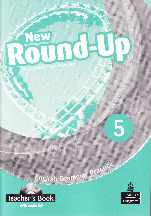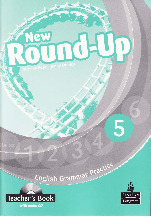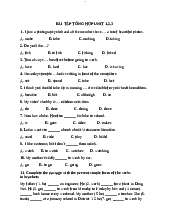













Preview text:
1.1.1 VERBS (ĐỘNG TỪ)
Fill in the blank with the correct form of the words in the box below. know talk bring think take be mean sit give try write go seem begin hear make see have happen provide
1. I didn’t ______ any phone calls.
2. In this essay, do not ______ more than 200 words.
3. She spoke so quietly I could hardly ______ her.
4. Please wait. Tea and biscuits will ______.
5. Don’t say that. I don’t want to ______ about it anymore.
6. What do you ______ about my new shoes?
7. We ______ to confuse the enemy yet.
8. A wealth of examples ______ by our teacher. 9. I want to ______ a nap.
10. What does this word ______ ? 11. He ______ only joking!
12. Something unusual is about to ______.
13. He ______ to feel depressed and helpless.
14. Would you ______ me a cup of coffee? 15. Mary ______next to me now.
16. Do you ______ the meaning of this word?
17. Did you ______ to bed late last night?
18. We ______ many boats sailing on the sea this morning.
19. She did not ______ at all afraid.
20. Do you ______ plans for this afternoon? Đáp án
1. I didn’t make any phone calls.
2. In this essay, do not write more than 200 words.
3. She spoke so quietly I could hardly hear her.
4. Please wait. Tea and biscuits will be provided.
5. Don’t say that. I don’t want to talk about it anymore.
6. What do you think about my new shoes?
7. We haven’t tried to confuse the enemy yet.
8. A wealth of examples is given by our teacher. 9. I want to take a nap. 10. What does this word mean? 11. He was only joking!
12. Something unusual is about to happen.
13. He began to feel depressed and helpless.
14. Would you bring me a cup of coffee?
15. Mary is sitting next to me now.
16. Do you know the meaning of this word?
17. Did you go to bed late last night?
18. We saw many boats sailing on the sea this morning.
19. She did not seem at all afraid.
20. Do you have plans for this afternoon?
1.1.2 MODAL VERBS ( ĐỘNG TỪ KHUYẾT THIẾU): Modal Verb Chức năng Ví dụ Chú ý
Diễn tả sự bắt You must go Mustn’t- sự cấm đoán, không
buộc ở hiện to bed at được làm gì đó.
tại hoặc tương 11.30 pm Example: You mustn’t smoke must lai. everyday. at the hospital. Lời đoán hoặc
Phủ định của “must” là “had sự chắc chắn to”. về điều gì đó
Example: They had to do this có căn cứ.
task yesterday because of running out of time.
Diễn tả khả I can speaking “Can” và “could” thường có năng hiện tại English
cùng chức năng: diễn tả khả hoặc tương lai fluently.
năng của ai đó hoặc cái gì có can mà ai đó có
thể xảy ra, sự cho phép. Tuy It can rain thể làm được, nhiên sắc thái khác nhau. today. hoặc sự việc
“Can” dùng hiện tại, “could” nào đó có thể
dùng quá khứ và có phần lịch xảy ra. sự hơn. Example: Yêu cầu sự Can I use your cho phép computer? Can I borrow your book?
Could I borrow your book? Diễn tả khả năng Diễn tả khả năng trong quá khứ could Sự xin phép một cách lịch sự Diễn tả khả năng may Sự cho phép
May I use “May” và “might” dùng để
your phone xin phép, tuy nhiên “might” please?
hầu như chỉ dùng trong câu
gián tiếp và ít dùng trong văn nói. Khả năng, xác
Example: He asked if she suất might come later.
“May” và “might” đều nói về might Hỏi sự cho
khả năng nhưng mức độ xảy phép một cách
ra thấp khi dùng “might”, còn lịch sự.
mức độ xảy ra cao hơn khi dùng “may”. Khả năng, xác Example: suất
I may join you tomorrow.
I might join you tomorrow.
Với quá khứ, chúng ta sử dụng may have/ might have Example:
I wonder why kate didn’t
answer her phone? She may have been asleep.
I can find my jey anywhere.-
You might have left it at work. need not Không cần I
needn’t Có thể sử dụng “don’t/
thiết, không come with us. doesn’t need to…” bắt buộc phải We don’t need to hurry. làm gì đó.
50 % sự ép You should / Should/ ought to cũng được buộc
ought to see a dùng khi diễ tả điều gì đó doctor.
không đúng nếu không xảy ra. Lời khuyên
You should / Example: Where’s Jane?- She ought to should be here right now. revise your lessons at should/ home. ought to Kết luận có căn cứ had better Lời khuyên You'd better ( tốt hơn hết do the là…..) homework right now. Have to
Bắt buộc phải You have to Mức độ bắt buộc của “have
làm gì đó vì sign your to” không cao bằng “must”. sự cần thiết name here.
Phủ định của have to là
“don’t/ doesn’t have to”. Will
Đoán sự việc It will be Will và would có thể dùng có thể xảy ra rainy
trong câu đề nghị, yêu cầu, trong tương tomorrow lời mời. lai
Example: Will you give me your address? Would Diễn tả giả He would be định xảy ra, exhausted
Would you like some coffee?
dự đoán sự when hear this việc xảy ra bad news. trong quá khứ
Đề xuất làm What shall we gì với ngôi meet? Shall “I”, “we” We shall hoặc giao commit doing
nhiệm vụ cho the articles in người khác the một cách agreement. trang trọng
Bài 1: Chọn động từ phù hợp
1. You ………..(should /can) listen to the new information.
2. You ………..(need/ may) park here.
3. People ………..(may not/ shouldn’t) waste food.
4. ………..(will/ would) it snow tomorrow?
5. ………..(may/could) I have a cup of tea, please?
6. You ………..(should/ might) do more exercise.
7. You ………..(couldn’t/ mustn’t) drink alcohol if you are under 18.
8. ………..(can/should) you play the piano?
9. ………..(could/would) you like to travel with your family?
10. I ………..(won’t/ shouldn’t) play badminton tomorrow.
Bài 2: Chọn động từ thích hợp
mustn’t (x2) must (x2) could
can (x2) can’t shouldn’t might
1. There are plenty of tomatoes in the fridge. You ……………buy any.
2. This is a hospital. You …………… smoke here.
3. He had been working for more than 11 hours. He ……………be tired now.
4. When I was a child, I ……………speak a little German.
5. The teacher said we…………… read this book for our own pleasure as it is
optional. But we …………..read it if we don’t want to.
6. ………you stand on your head for more than a minute? No, I…………
7. If you want to learn to speak English fluently, you …………worry. We will
help you become a fluent speaker but you have to work hard.
8. Take an umbrella. It ………….rain later.
9. People ………..walk on the grass.
10. Drivers …………stop when the traffic lights are red. Bài 1
1. should 2. may 3. shouldn’t 4. Will 5. May 6. should
7. mustn’t 8. Can 9. Would 10. won’t Bài 2
1. needn’t 2. mustn’t 3. must 4. could 5. can/ needn’t
6. can/ can’t 7. shouldn’t 8. might 9. mustn’t 10. must 1.2 NOUNS (DANH TỪ)
a) nouns with “ such (a)’’
S + V + such + (a/an) + adj + noun + that + S + V
Lưu ý: Đối với các danh từ số ít hoặc không đếm được thì không dùng a/an Ví dụ:
- This is such difficult homework that it took me much time to finish it. (Bài tập về
nhà khó đến nỗi tôi mất rất nhiều thời gian mới làm xong).
- They are such beautiful pictures that everybody will want one. (Chúng quả là
những bức tranh tuyệt đẹp mà ai cũng muốn sở hữu)
- Anna has such a soft voice that everyone likes her. (Anna có một giọng hát nhẹ
nhàng đến nỗi mọi người đều thích cô ấy.)
b) Sở hữu cách (possessive case) là một hình thức chỉ quyền sở hữu của một
người đối với một người hay một vật khác.
ví dụ: - the car of the engineer ==> the engineer’s car
- the door of my class, the roof of the house.
- The room of the boys = The boys’ room.
- Carol and Susan’s car (xe hơi của Carol và Susan)
- children’s books (sách của trẻ em)
- students’ library (thư viện của sinh viên)
- Mary’ s shirt (áo sơ mi của Mary)
- Tom’ s father (cha của Tom)
c) Tính từ sở hữu (Possessive adjectives) I (Tôi) My (của tôi) /mai/ You (số ít) Your /j :/ (Bạn, anh, chị,
(của bạn, của anh, của ông, bà…)
chị, của ông, của bà…) You (số nhiều) Your /j :/ (Các bạn, các
(của các bạn, của các anh các chị…)
anh , của các chị…) They (Họ,
Their (của họ, của chúng /ðeə/ chúng nó…) nó…) We (Ta, chúng
Our (của ta, của chúng /’auə ta…) ta…) / She (Cô ấy, bà
Her (của cô ấy, của bà ấy, /hə:/ ấy, chị ấy….) của chị ấy….) He (Anh ấy,
His (của anh ấy, của ông /hiz/ ông ấy,…) ấy,…) It (Nó) Its (của nó) /its/
Ex: I’m looking for her baby.
(Tôi đang chăm sóc con của cô ấy)
Trong ví dụ trên, “her” là tính từ sở hữu đặt trước danh từ “baby”, để chỉ quyền
sở hữu “em bé” được chăm sóc là của “cô ấy”. Ví dụ:
This is my book (Đây là cuốn sách của tôi).
Her mother is very beautiful (Mẹ của cô ấy rất đẹp).
Our car is very modern (Xe của chúng ta rất hiện đại).
My phone is very cheap (Điện thoại của tôi rẻ) Bài tập
I have finished ….. homework tonight.
Linda is talking with ….. mother.
Tom doing homework with… sister.
In the morning, Lyly water ….. plants and feed … dogs.
She is wearing shoes. …. shoes are very lovely.
The cat wagged ….. tail
Next weekend, she is going to visit ….. parents and …. grandmother.
Every morning, Tom often take …. dog for a walk.
Lyly is sick. I will bring her….. homework.
Jack just gave me a tree in …. garden. Đáp án my her his her/her her its her/her his my his
d) adjective phrase with preposition (Tính từ + Giới từ)
- học theo trong tờ phụ lục
- sau giới từ luôn là Động từ thêm đuôi -ing (Ving) hoặc danh từ
e) Cách dùng tính từ đuôi ing và ed
- Tính từ đuôi ing: dùng để miêu tả về tính chất, đặc trưng của người, sự vật, hiện tượng. Ví dụ:
The film is very interesting. Lúc này, tính từ interesting dùng để diễn tả tính chất của bộ phim.
The meeting is boring. Cuộc họp rất nhàm chán
- Tính từ đuôi ed: dùng để diễn tả cảm xúc hoặc nhận xét của người hoặc vật về
một sự vật, hiện tượng hay sự việc nào đó. Ví dụ:
I’m interested in the film. Lúc này, tính từ interested diễn tả cảm xúc của chủ ngữ đối với bộ phim.
*Một số cặp tính từ đuôi ing và ed được sử dụng phổ biến trong câu
- interesting/interested: thú vị
- pleasing/pleased: vui, hài lòng
- surprising/surprised: bất ngờ.
- tiring/tired: mệt mỏi, chán ngán.
- disappointing/disappointed: thất vọng
Hoàn thành câu trong các tình huống bên dưới, sử dụng tính từ đuôi ing hoặc ed
1.1. This film wasn't as well as we had expected. (disappoint...)
a This film was disappointing.
b We were disappointed with this film.
1.2. Mary teaches blind children. It's a very hard job, but she loves it. (exhaust...)
a Mary loves her job but it's often ............... .
b At the end of a day's work, Mary is often ........ .
1.3. The air’s so fresh. I love this country. (interesting...)
a This country is ............... .
b This country makes me ............... .
1.4. Tiara is going to New York next week. It’s the first time she has visited this city. (excit...)
a It will be an ....... experience for her.
b Going to new places is always ............... .
c She is really ...... about going to New York.
Chọn các tính từ đuôi ing và ed đúng nhất
2.1. I was disappointing/disappointed with the book. I had expected it to be better. (disappointed is correct)
2.2. Are you interesting/interested in soccer?
2.3. The hockey game was very exciting/excited. I enjoyed it.
2.4. It's sometimes embarrassing/embarrassed when you have to borrow money.
2.5. Do you easily get thrilling/thrilled?
2.6. I had never expected to get this project. I was really amazing/amazed when I was offered it.
2.7. She has really learnt very well. She has made astonishing/astonished semester.
2.8. I didn't find the situation funny. I was not amusing/amused.
2.9. It was a really frightening/frightened experience. Afterwards everybody was very worried/worrying.
2.10. Why do you always look so tiring/tired? Is your life really so tiring/tired?




